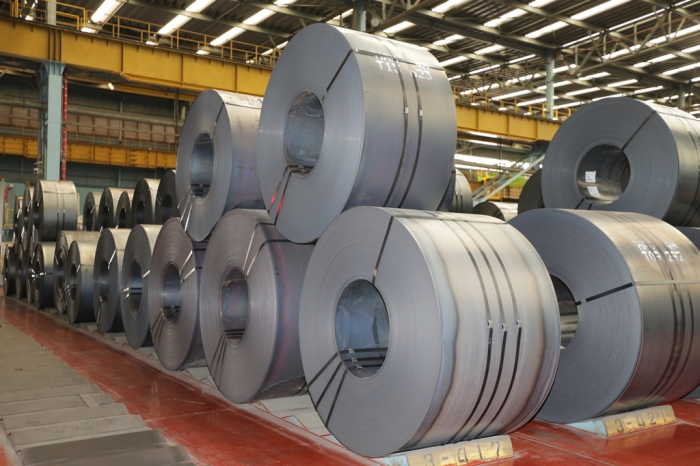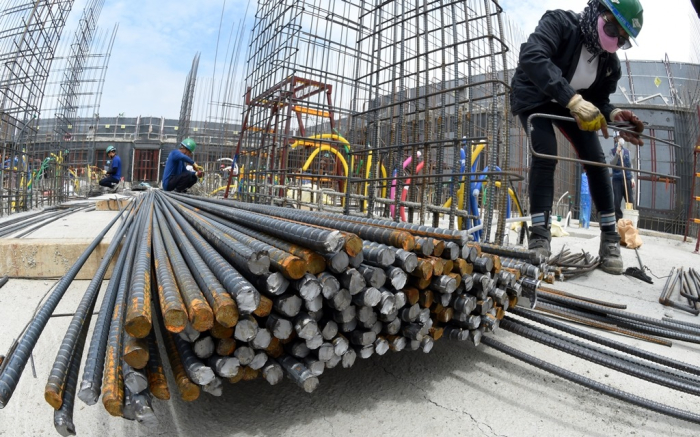Steel
Japanese steelmakers flood South Korea on back of weaker yen
Japan's hot rolled steel plate market share posted a six-year high in S.Korea; industry urges Seoul to take anti-dumping measures
By Sep 20, 2023 (Gmt+09:00)
4
Min read
Most Read
LG Chem to sell water filter business to Glenwood PE for $692 million


Kyobo Life poised to buy Japan’s SBI Group-owned savings bank


KT&G eyes overseas M&A after rejecting activist fund's offer


StockX in merger talks with Naver’s online reseller Kream


Mirae Asset to be named Korea Post’s core real estate fund operator



Japanese steelmakers are expanding their market shares in South Korea, backed by the yen's drop against the Korean won to the lowest in eight years. This is biting into rivals such as POSCO Holdings Inc. that already face pressures brought on by an economic downturn at home amid China’s property crisis.
Korean imports of hot rolled steel plates from Japan is expected to surge 44% to 2.4 million tons this year, the largest amount since 2017, industry sources said on Wednesday. The island nation has shipped 1.6 million tons to its neighbor in the first eight months of 2023, up 44% from a year earlier, according to the sources.
The surge comes as the yen depreciated more than 7% against the won, to its lowest level since June 2015, which has increased the price competitiveness of Japanese products in South Korea.
Japanese hot rolled steel plates — key materials in the manufacture of most other steel products including electrical steel sheets — were even cheaper than Chinese-made goods in Korea. The import price of good-quality Japanese hot rolled steel plates averaged 807,000 won ($606.8) per ton during the January-August period, about 2% below that of Chinese products.
That propelled smaller Korean steelmakers and electronics makers to opt for Japanese hot rolled steel plates.
EXPANDING MARKET SHARES
The Japanese products made up 58% of all imported hot rolled steel plates, the highest ratio since 2020. Japanese hot rolled steel plates accounted for 23% of Korean imports during the first eight months of this year.
Taking advantage of the yen's weakness, Japanese steelmakers such as Nippon Steel Corp., JFE Steel Corp. and Kobe Steel Ltd. shipped hot rolled steel plates at prices 15% below those for its local market, industry sources said.
“The requests are increasing among smaller Korean steelmakers and home appliance manufacturers, which process hot rolled steel plates into other products, to cut prices by as much as those of Japanese products,” said an official at POSCO, the world’s seventh-largest steelmaker.
It usually takes three months for Korean firms to import Japanese steel, compared with one or two months for POSCO products. Despite the longer procurement time, they still preferred the cheaper items, the official said.
Japanese steelmakers might not suffer losses from the low sale prices in Korea because they can raise prices at home, industry sources in Seoul said. Nippon Steel President Eiji Hashimoto in February unveiled a plan to ramp up steel product prices in Japan.
FURTHER BLOW
That hurt POSCO, which has already been struggling from a slowdown at home and the property crisis in China.
“The Korean steel industry is facing a catastrophe from the shrinking manufacturing sector and the Chinese property crisis,” said Lee Jinwoo, senior principal researcher at the POSCO Research Institute. “We need to strengthen import barriers, which currently lack tariffs, with stricter industrial standards.”
Other Korean steelmakers such as Hyundai Steel Co., Dongkuk Steel Mill Co. and Daehan Steel Co. Ltd. are also keeping an eye on imports of reinforcing bars from Japan, though the local market has not yet been hit by Japanese-made products, the sources said.

“Prices of reinforcing bars have already dropped amid the sluggish domestic property market and sellers' inventories have piled up,” said an industry source. “Smaller builders, however, prefer Japanese products because of (profit) margins.”
OVERSEAS MARKETS
Korean steelmakers struggle to compete with their Japanese rivals in overseas markets, particularly in Southeast Asia, a core battlefield among steelmakers in the two Northeast Asian countries and China.
Korea exported 3.1 million tons of steel products to Association of Southeast Asian Nations (ASEAN) countries in the first eight months of 2023, down 5.8% from a year earlier, according to the Korea Iron & Steel Association. Korea’s market share in the ASEAN region slid from 18.6% to 16.9% over the same period.
Backed by a softer yen, Japanese steel products are also biting into Korea’s share in Southeast Asia, which makes up 13% of its steel exports, industry sources said.
Korean steelmakers are competing fiercely with their Japanese rivals in overseas markets because their technology, prices, and market dominance do not differ much.
Industry sources in Seoul urged the government to support the domestic sector.
“Korea has taken no action while the US and Europe consider steel a core industry and defend the sector with protectionism,” said one source.
“Japanese steelmakers’ price cutting in Korea is an unfair trade practice,” said the sources, urging Korean authorities to pursue anti-dumping measures.
Write to Hyung-Kyu Kim at khk@hankyung.com
Jongwoo Cheon edited this article.
More to Read
-
 EconomySouth Korean exporters jittery as China's slowdown raises red flag
EconomySouth Korean exporters jittery as China's slowdown raises red flagAug 30, 2023 (Gmt+09:00)
3 Min read -
 EconomyKorea sales set to China to fall for 15th straight mth on property crisis
EconomyKorea sales set to China to fall for 15th straight mth on property crisisAug 21, 2023 (Gmt+09:00)
3 Min read
Comment 0
LOG IN


